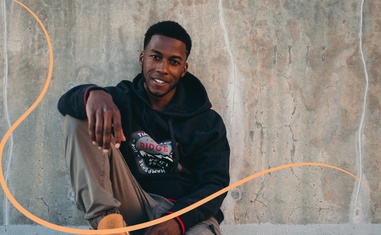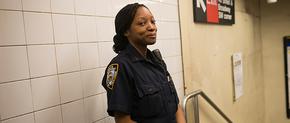The views expressed in our content reflect individual perspectives and do not represent the authoritative views of the Baha'i Faith.
On a hot day in the summer of 2021, I found myself walking along a quiet waterfront in Frederiksted, St. Croix in the U.S. Virgin Islands.
I looked out over the white sandy beaches and followed the shoreline as it descended beneath a sheet of translucent blue-green water. I breathed in the smell of the sea and listened to the sound of intermittent gusts of wind as they whipped the palm fronds and tugged at my thin clothes.
A few locals sat on park benches speaking Creole, as a small group of tourists clustered together for a selfie near the sea wall. Feral chickens darted back and forth across the grass and pecked at the ground for food scraps. In this sleepy seaside town named after Frederik V of Denmark, who purchased the Danish West Indies in 1754, I hoped to conduct the research for my forthcoming book.
RELATED: Why We Need a New Understanding of ‘Blackness’
I had come here to uncover the roots of civil rights leader and native Crucian Ashley Totten, my maternal great grandfather. I had come here to walk in the footsteps of my ancestors across the grounds of the slave plantations with their fanciful names that belie a brutal history: Estate Whim; Estate Little Princess; Estate Mount Washington. But most of all, I had come here for restoration and renewal.
After nearly two years of witnessing the recorded murders of unarmed Black people, and managing the psychological trauma brought on by those events in the midst of the social isolation of the Covid-19 pandemic, I felt completely exhausted. After nearly two years of participating in social discourses on race, while simultaneously bearing the weight of the mental and emotional stress such discussions necessarily engender, I needed to take a break and replenish my resources. I needed to immerse myself in a community where Blackness didn’t feel like a social stigma – where my skin color wasn’t a “complication” that needed to be “negotiated.”
I needed to exist in a space where Black joy wasn’t constantly being impinged upon by Black suffering and Black death.
The Faces of My Forebears
So I came to the island of St. Croix to look into the faces of beautiful Black people – so many of whom looked like members of my own family – as I walked along its streets lined with the architectural legacy of Danish colonialism. I needed to be reminded of the resiliency and the resolve of my ancestors. The enslaved population of St. Croix, no doubt inspired by the Haitian revolution of 1791-1804, forced the Danish governor to abolish slavery when they took control of Frederiksted in 1848, blowing conch shells as they marched to rouse the Black population to arms.
Three Crucian women known as the “queens” – Mary Thomas, Axeline Elizabeth Salomon, and Mathilda McBean – led a subsequent rebellion in 1878 to protest the impoverished conditions of the formerly enslaved. That uprising culminated in the burning of the city of Frederiksted, now known as Freedom City. As I learned these things, I thought of the many rebellions on the U.S. mainland, where enslaved populations rose up against overwhelming odds to fight for freedom and justice. I thought about the words of Abdu’l-Baha in the Baha’i teachings, and how those powerful passages center justice as the pillar upon which all human civilization rests:
As forgiveness is one of the attributes of the Merciful One, so also justice is one of the attributes of the Lord. The tent of existence is upheld upon the pillar of justice, and not upon forgiveness. The continuance of mankind depends upon justice and not upon forgiveness. So if, at present, the law of pardon were practised in all countries, in short time the world would be disordered and the foundations of human life would crumble. To recapitulate: the constitution of the communities depends upon justice, not upon forgiveness.
For me, Abdu’l-Baha’s words confirm that justice is the first order of business – the bedrock upon which the road towards forgiveness and reconciliation is paved.
I experienced something revelatory in reading this, something that seemed like a validation despite all those times spent in spaces where dialogues on race too often felt like a bland affectation of unity which emphasized form over substance. Many of these discussions, I realized, had a performative quality, which seemed engineered to avoid the difficult conversations necessary to peel away the veils of obfuscation and self delusion that cloud the cleansing light of truth.
All Virtue Comes from Truthfulness
All virtue, the Baha’i writings affirm, is based on truthfulness – so the pillar of justice must be positioned on the level ground of reality to support the “tent of civilization.”
Public and private discourse that prioritizes comfort over authenticity and vulnerability may appease a narcissistic desire for superficial sentimentality, but it can never satiate the deeper thirst of the spirit, that primordial longing of the heart which naturally attunes itself to the truth and the moral imperative for justice.
That’s why I have little patience for those who are more concerned with the presentation of oneness than with building sincere relationships based on a courageous love ethic that does not yield to the countervailing forces of cowardice and comfort in doing restorative justice work. This, the Baha’i teachings say, requires absolute truthfulness:
Again: be ye most careful that, God forbid, not one single word contrary to truth issue from your mouths. One falsehood throws man from the highest station of honour to the lowest abyss of disgrace. Always guard yourselves against this enemy so that all you state may correspond with reality. Forever supplicate and entreat at the Court of Majesty and beg confirmation and assistance …
As I reflected further on the history of African American rebellion and protest, I thought about the historical shaming of Black anger. How could a country born of revolution tolerate the outrage fomented by a tax on British tea, but in regards to Black people, the only acceptable models of resistance always centered our long suffering, our Job-like patience, and our forgiveness – but refused to make space for the justifiable anger that fueled protest in the first place.
I thought about how Black men and women have often been characterized as angry and how, within the context of moral uprightness, an unapologetic expression of anger was an indication of a lower nature – a racist trope often applied to Black people. I thought, too, about the profound irony of such a statement.
RELATED: “Are You Angry?” What I Get Asked As a Black Man
The Baha’i teachings counsel humanity to discipline our anger – that there exists a right and a wrong way to make use of this potentially destructive force. In his book Some Answered Questions, Abdu’l-Baha said:
If he exercises his anger and wrath against the bloodthirsty tyrants who are like ferocious beasts, it is very praiseworthy; but if he does not use these qualities in a right way, they are blameworthy.
This insightful teaching stresses regulation and control as the means to transform anger from a destructive force to a constructive one. In this context, anger justly directed against the “bloodthirsty tyrants” is worthy of praise and not derision. This does not justify or recommend violence – but it does make it understandable, especially when it comes from such a severely oppressed people.
Racism and the Tyrant
As I walked through the streets of Frederiksted, I thought about how the tyrant is embodied in the enduring legacy of systemic racism: bloodthirsty, certainly; ferocious, without question. Seeing the points of congruence between the archetype of the tyrant and the dehumanization and objectification at the heart of racism, I reconciled with my anger. Free of the need to deny or suppress it, I could channel it through the framework of action that the Baha’i world community engages in to build community and dismantle the corrupt edifices of bigotry and hate. Empowered by Baha’u’llah’s vision of the oneness of humanity, I could now answer those who sought to trigger me by questioning my anger, by asking them: given what we know about the multigenerational brutality of systemic racism, you should ask yourself why YOU are not angry.
If we are truly one human family, then I cannot be passive or silent when my kinfolk are oppressed, brutalized, and dying. To be a Baha’i is to accept a holy commission to stand up for righteousness, to stand up for truth, to stand up for justice.
A few days before I left St. Croix, I followed a meandering road through the mountains on a drive up to the historic Estate Mount Washington. Built in 1780 as a sugar and cotton plantation, the lush landscape with its exotic bird species and roaming iguanas is dominated by the “great house” which overlooks a sugar press, where the enslaved fed sugarcane stalks through a set of giant rollers to extract the highly valued cane juice. As I stood on that hillside, in the shadow of the sprawling 18th century estate, I felt a tension within me. I stood at an intersection of absurd realities: the astonishing beauty of the grounds and the surrounding mountains with distant views of the ocean, and the grotesque brutality of the slave system that made such a place possible.
I tried to imagine the enslaved responding to the call of the conch shell as they fortified themselves for the coming uprising. Divested of any other means of liberation, they channeled the righteous indignation they no doubt felt through armed rebellion. As I envisioned an ancestral stream of bodies pouring down the mountainside to join a river of determined advocates for justice, the tension I felt receded, and a wave of pride rose within me. I was thankful for their courage, thankful for their determination, thankful for their sacrifice.
Soon it was time for me to head back to the mainland where I would join a diverse cohort of coworkers, some Black, some White, some Asian, some Indigenous, some Latino, together forming a powerful river of converging tributaries directed by the revelation of Baha’u’llah, to inundate the parched Earth with the life-giving waters of justice and equality.

















Comments
Sign in or create an account
Continue with Facebookor